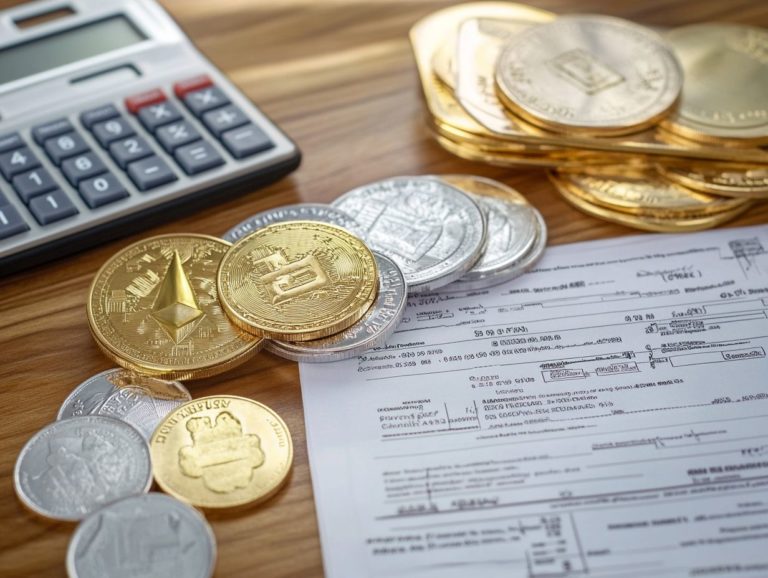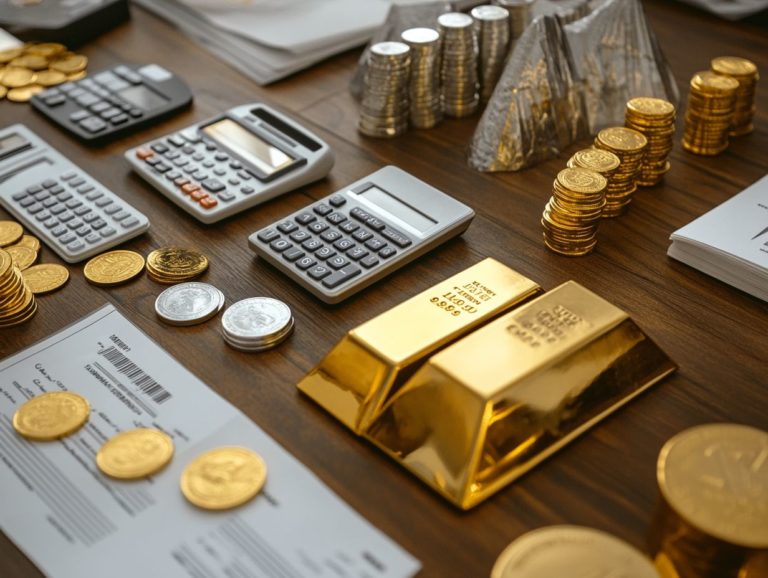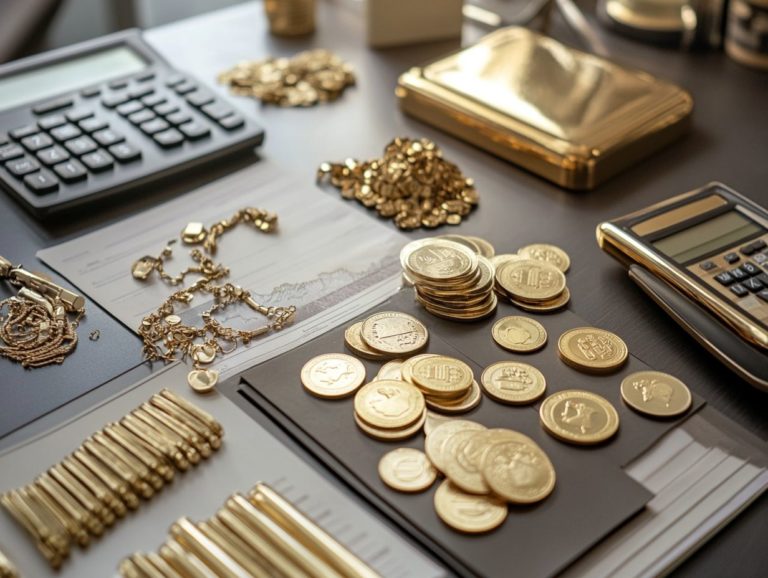The Impact of Tax Policies on Precious Metals Investment
Navigating the world of precious metals investment can be intricate. Understanding the tax implications greatly affects your investment decisions.
Tax policies significantly influence your strategies, impacting everything from capital gains to inheritance tax. These regulations shape the returns you can anticipate and directly affect market dynamics, demand, and prices.
Dive into this article to discover how to boost your investment success! We will explore the various types of taxes applicable to precious metals and how they influence market behavior. You’ll also find strategies to effectively manage your tax liabilities and consider potential changes in tax policies that could transform the investment landscape.
Explore this content to uncover vital insights that could elevate your investment journey.
Contents
- Key Takeaways:
- The Importance of Tax Policies in Precious Metals Investment
- Types of Taxes on Precious Metals Investment
- How Tax Policies Affect Precious Metals Prices
- Strategies for Managing Taxes on Precious Metals Investment
- Future Outlook for Tax Policies and Precious Metals Investment
- Frequently Asked Questions
- 1. How do tax policies affect precious metals investment?
- 2. Are there any tax advantages to investing in precious metals?
- 3. Can tax policies discourage investors from investing in precious metals?
- 4. How does the taxation of precious metals differ from other investment options?
- 5. Are there tax implications when buying and selling precious metals?
- 6. How can investors stay informed about tax policy changes for precious metals?
Key Takeaways:
- Tax policies play a crucial role in shaping investment decisions in precious metals.
- Different types of taxes, such as capital gains, income, and inheritance tax, can significantly impact precious metals prices.
- Investors can manage taxes on precious metals by maximizing tax benefits and minimizing tax liabilities.
The Importance of Tax Policies in Precious Metals Investment
Understanding tax policies is essential for you as an investor in precious metals, as these regulations can greatly affect your investment decisions, capital gains, and overall financial growth.
The relationship between tax implications and market dynamics is pivotal in shaping your investment strategies, especially in times of economic uncertainty.
By grasping the IRS regulations regarding gold IRAs and other precious metals investments, you position yourself to make informed decisions that enhance your returns while effectively minimizing tax liabilities.
Understanding the Role of Taxes in Investment Decisions
Taxes hold significant influence over your investment choices, impacting everything from the assets you choose to the timing of your sales and purchases.
When exploring different strategies, consider the differences between ordinary income tax rates and capital gains tax rates. These distinctions can dramatically affect your net returns. For instance, investments generating capital gains are typically taxed at a lower rate, making them particularly appealing for long-term investors. This insight can help you craft the right portfolio mix.
Engaging with tax professionals is essential, as they can guide you through the ever-changing landscape of reporting requirements. They ensure you remain compliant while maximizing potential tax advantages aligned with your financial objectives.
Types of Taxes on Precious Metals Investment
Investing in precious metals requires careful navigation through various taxes that can significantly affect your net returns. You’ll need to consider capital gains tax, income tax, and even inheritance tax, depending on the specific nature of your investment.
Being aware of these factors is crucial for maximizing your financial outcomes.
Capital Gains Tax
Capital gains tax impacts the profits you earn from selling precious metals. It s essential to differentiate between short-term and long-term gains.
Short-term gains, taxed at ordinary income rates, tend to carry a heavier burden, while long-term gains benefit from a more favorable tax structure.
When you’re investing in metals like gold, silver, and platinum, understanding these tax classifications is crucial, as they can significantly affect your overall returns. Short-term gains occur when you hold these assets for a year or less, subjecting you to personal income tax rates that can range from 10% to 37%, depending on your income bracket.
On the flip side, long-term gains apply to metals held for over a year, typically capped at 20% for higher earners. It s vital for you to strategize your selling timeline to maximize tax efficiency and enhance your returns.
For further guidance, consider consulting a tax professional to navigate the complexities of precious metals investing.
Income Tax
Income tax can significantly impact your investments in precious metals. Profits from sales are categorized as ordinary income instead of capital gains. This distinction is crucial because ordinary income may be taxed at a higher rate than capital gains, which often enjoy a lower tax bracket.
Navigating this complex tax rule requires careful consideration to achieve the best financial outcomes. Understanding how various classifications of income affect your overall returns is critical, particularly concerning the timing of your sales and holding periods.
Stay informed about potential deductions and employ strategies for tax-loss harvesting to manage your precious metals investment portfolio effectively.
Inheritance Tax
Inheritance tax could be a factor when transferring precious metals to your heirs. This introduces an additional layer of tax implications to consider.
This tax can significantly affect the net value of the assets you pass down, including valuable items like gold, silver, and platinum bullion. It is essential to consider not only the current market valuation of these metals but also how any capital gains (profits made from the sale of an asset) realized upon their sale may impact your tax obligations.
If you are contemplating charitable donations of precious metals, understanding the potential benefits and deductions available is crucial. Being aware of these factors enables you to navigate the complex landscape of asset disposal, ensuring a seamless transition of wealth for your family.
How Tax Policies Affect Precious Metals Prices
Tax policies exert a considerable influence over the prices of precious metals, primarily by shaping the dynamics of supply and demand. Understanding these nuances is essential for you as an investor, especially when aiming to optimize your investment strategies during times of economic uncertainty.
Being attuned to how tax regulations impact the market allows you to navigate your investments with greater insight and foresight.
How Taxes Affect Supply and Demand for Precious Metals
Tax policies can drive fluctuations in supply and demand for precious metals, influencing market prices and establishing these assets as effective hedges against inflation.
When governments tweak tax incentives or introduce tariffs on imports and exports, they subtly shape how much of these valuable resources are mined, traded, and stored. For instance, if taxes on gold sales rise, you might notice a dip in consumer demand, while tax incentives for mining companies could spur increased supply.
These shifts create a ripple effect, prompting investor sentiment to react not just to the current tax landscape but also to anticipated future regulations. Analyzing these factors clarifies why many market participants gravitate toward precious metals, especially during periods of economic uncertainty, reinforcing their status as a stable investment. Additionally, understanding the role of precious metals in tax-deferred accounts can provide further insights into their appeal.
Influence on Investor Behavior
Investor behavior is profoundly influenced by tax policies, shaping your investment strategies and guiding your compliance with reporting requirements.
When considering investments in precious metals like gold and silver, the impact of tax policy changes on precious metals becomes pivotal in your decision-making process. Different jurisdictions impose varying tax rates and rules regarding capital gains, significantly impacting the profitability of these assets.
As this investment market segment evolves, it is crucial to stay informed about changes in tax regulations. This knowledge allows you to optimize your portfolio, maximizing returns while adhering to compliance standards. Such awareness can lead to strategic shifts in your approach, whether you decide to hold physical assets or invest through tax-advantaged vehicles.
Strategies for Managing Taxes on Precious Metals Investment
Implementing effective strategies for managing taxes on your precious metals investments can maximize tax benefits while minimizing liabilities, ensuring compliance with IRS regulations.
Consider consulting a tax professional for personalized advice on optimizing your tax strategy for precious metals investments.
Maximizing Tax Benefits
Maximizing your tax benefits involves various strategies. These include using tax deductions for charitable donations of precious metals and mastering how to report your investment returns.
As an investor in precious metals, you can enhance your tax efficiency. Timing the sale of your assets can help you align with tax on profits when you sell an investment. Additionally, exploring opportunities for understanding tax credits related to precious metals is beneficial. Engaging in these strategies minimizes tax liabilities while optimizing your overall investment portfolio.
Keeping accurate records of all transactions is crucial. Consulting with a tax professional specializing in precious metals can provide valuable insights into eligible deductions.
By leveraging these approaches, you can fully capitalize on potential tax savings while ensuring compliance with regulations.
Minimizing Tax Liabilities
Minimizing tax liabilities in your precious metals investment requires understanding IRS regulations. Effective tax strategies should be tailored to your unique investment portfolio.
You’ll need to navigate specific guidelines governing the buying and selling of gold, silver, and other precious metals. Staying updated on capital gains taxes is essential, as is meticulously maintaining records of your purchases, sales, and any associated expenses. For more detailed information, refer to understanding the tax effects of precious metals investments.
Using strategies like tax-loss harvesting can significantly reduce your overall tax burden. Weighing the choice between a self-directed IRA and a standard brokerage account can also enhance your tax strategy. Understanding the differences between collectibles and bullion can give you significant advantages at tax time.
Future Outlook for Tax Policies and Precious Metals Investment
The future of tax policies could bring exciting changes for investors in precious metals! Economic fluctuations and potential regulatory shifts may impact tax implications for you as an investor.
Being aware of these dynamics is essential for effectively navigating your investment strategies.
Predictions and Potential Changes
Predictions about tax policy changes suggest that you may experience shifts driven by evolving economic conditions. This could impact the investing landscape for precious metals.
As policymakers scrutinize the current economic climate particularly inflation rates and consumer spending trends you should prepare for possible adjustments to tax regulations. These changes could include tweaks to capital gains tax or new incentives for sustainable investments.
For both seasoned collectors and newcomers, understanding how tax liabilities could reshape investment strategies is vital. During this transitional phase, keeping close tabs on legislative discussions will be crucial for anyone aiming to navigate the complexities of precious metal investments.
Frequently Asked Questions
1. How do tax policies affect precious metals investment?
Tax policies really matter when it’s time to cash in on your precious metals investment! Changes in capital gains tax rates can directly affect the returns on investments in gold, silver, and other precious metals.
2. Are there any tax advantages to investing in precious metals?
Yes, there are tax advantages to investing in precious metals. Some countries offer tax-free status for investments in certain types of physical gold, such as gold coins and bars.
3. Can tax policies discourage investors from investing in precious metals?
Absolutely! Tax policies can deter investors from entering the precious metals market. If tax rates on these investments are higher than those of other options, it may discourage some investors.
4. How does the taxation of precious metals differ from other investment options?
The taxation of precious metals varies from traditional investments. Precious metals usually face different tax treatment compared to stocks and bonds. Furthermore, tax rates and regulations for these investments differ from country to country.
For personalized advice, always consult a tax professional to ensure you’re making informed decisions in the world of precious metals investments!
5. Are there tax implications when buying and selling precious metals?
Yes, there are tax implications when buying and selling precious metals. Capital gains taxes apply when you sell precious metals for a profit.
Some countries also charge sales tax on certain purchases.
6. How can investors stay informed about tax policy changes for precious metals?
Investors should regularly follow financial news to stay updated on tax laws. Consulting a financial advisor or tax professional can provide personalized advice on how these policies may affect your investments.















